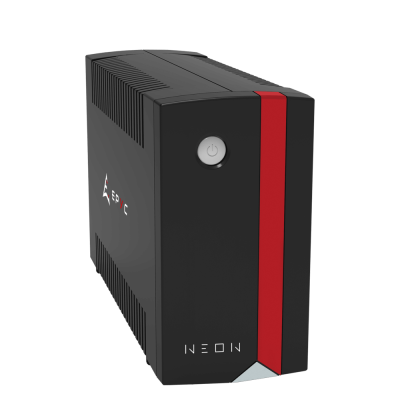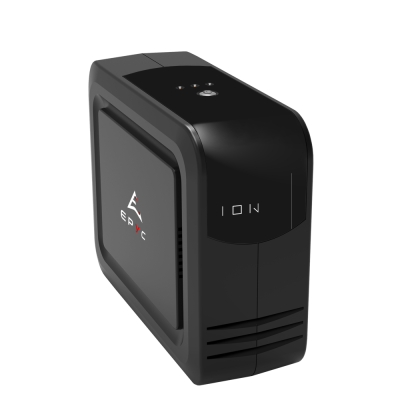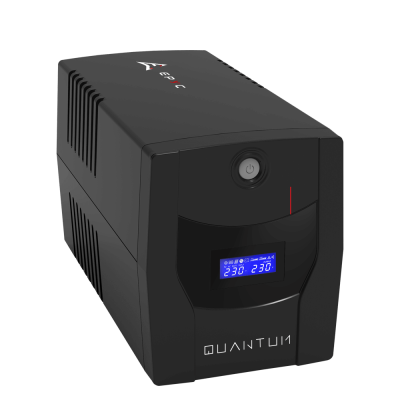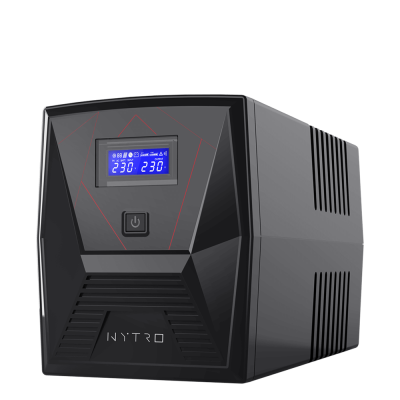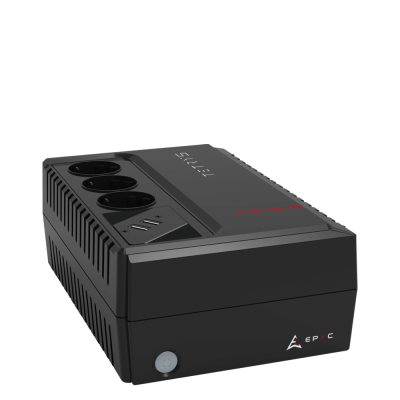UPS for shops and retail
In a retail environment, uptime isn’t optional: payments, POS systems, network connectivity and security must stay operational—even during micro-outages or voltage drops.
Just a few seconds of instability can cause queues, failed transactions and data loss, directly impacting revenue and the customer experience.
The solution is to install the right UPS inside your store—one that stabilises voltage continuously, reduces unnecessary battery use, and, when needed, provides enough backup time to complete ongoing operations and shut everything down safely.

Which devices need a UPS in a retail store?
Modern retail spaces rely on a wide range of technologies: POS terminals, data networks, payment systems, surveillance equipment and back-office hardware.
Different functions, different power requirements—but one shared need: stable power and the ability to close operations cleanly whenever the mains supply becomes unreliable.
POS and payments. The heart of your store. POS PCs, receipt printers and payment terminals must stay powered during fiscal receipt printing or a card transaction. A UPS prevents freezes and data corruption, giving staff the time they need to complete the receipt and save data.
Even low-consumption devices like barcode scanners and customer displays should be protected to avoid unwanted reboots.
Network and connectivity. Modems, switches, access points and VoIP systems keep POS terminals and management software online—often linked to the cloud.
If connectivity fails, payments and software stop working. That’s why protecting your network infrastructure with a properly sized UPS is essential.
Video sourveillance and security. NVRs/DVRs and PoE switches powering cameras must stay online to avoid recording gaps and to maintain remote video access.
Learn more in our dedicated guide: UPS per Video sourveillance.
Digital signage and kiosks. Shop-window displays and multimedia kiosks are sensitive devices that require a controlled shutdown and, in some cases, enough autonomy to avoid interrupting on-screen messages.
Back office PCs. A UPS keeps administrative PCs and small NAS systems running long enough to save documents and shut down safely. Via USB connection, the UPS can even trigger automatic shutdown when autonomy is nearly exhausted. For a deeper dive, visit our page: UPS for offices.
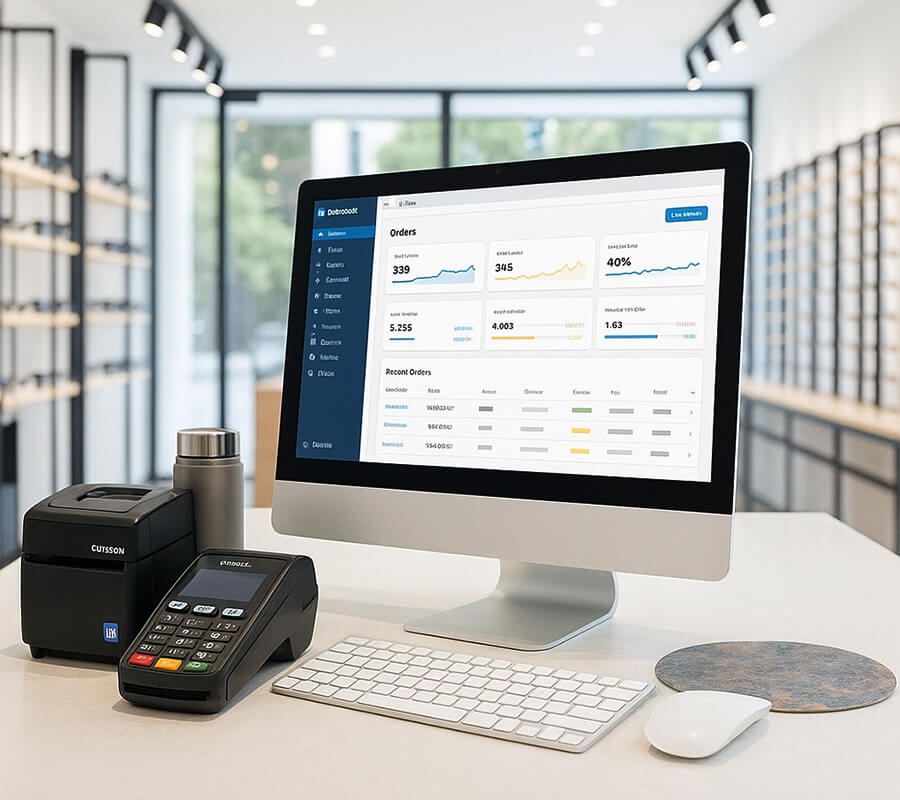
Epyc's advice
Devices with motors or compressors—such as refrigerated counters, air conditioners, vending machines or electric shutters—generate high inrush currents and are not suitable for Line-Interactive UPS units.
These loads require a double-conversion Online UPS.
Choosing a UPS for your store?
Selecting the right UPS starts with evaluating power capacity and autonomy—the two factors that determine how long your equipment will stay operational during a blackout.
Begin with the list of truly essential devices, define the minimum backup time you need, and size accordingly.
Always pay attention to devices with active PFC (Mac computers, high-performance PCs, some media players and NAS units). These require a pure sinewave UPS.
For more sensitive electronics, we also recommend an AVR-equipped Line-Interactive UPS.
| Operational Scenario | Typical Loads | Estimated Consumption | Recommended UPS | Indicative Runtime |
| POS Station | All-in-one POS Thermal printer Barcode reader |
50 Watt | Capacity: 650–850 VA Models: NEON, ION |
20–40 minutes |
| Network Connectivity | Modem/router Switch (PoE) Access Point VoIP |
30 Watt | Capacity: 650–850 VA Models: NEON, TETRYS |
30–50 minutes |
| Video Surveillance | NVR/DVR PoE switch 6x IP cameras |
60 Watt | Capacity: 850–1000 VA Models: TETRYS, NEON |
30–60 minutes |
| Multimedia Kiosk | Player | 100 Watt | Capacity: 800–1500 VA Models: NYTRO |
30–70 minutes |
| Back Office | PC Monitor NAS |
200 Watt | Capacity: 1000–1500 VA Models: ION, QUANTUM |
15–30 minutes |
Choosing a UPS for your store?
Selecting the right UPS starts with evaluating power capacity and autonomy—the two factors that determine how long your equipment will stay operational during a blackout.
Begin with the list of truly essential devices, define the minimum backup time you need, and size accordingly.
Always pay attention to devices with active PFC (Mac computers, high-performance PCs, some media players and NAS units). These require a pure sinewave UPS.
For more sensitive electronics, we also recommend an AVR-equipped Line-Interactive UPS.
| POS Station | |
|---|---|
| Typical Loads | All-in-one POS Thermal printer Barcode reader |
| Estimated Consumption | 50 Watt |
| Recommended UPS | Capacity: 650–850 VA Models: NEON, ION |
| Indicative Runtime | 20–40 minutes |
| Network Connectivity | |
|---|---|
| Typical Loads | Modem/router PoE switch Access Point VoIP |
| Estimated Consumption | 30 Watt |
| Recommended UPS | Capacity: 650–850 VA Models: NEON, TETRYS |
| Indicative Runtime | 30–50 minutes |
| Video Surveillance | |
|---|---|
| Typical Loads | NVR/DVR PoE switch 6x IP cameras |
| Estimated Consumption | 60 Watt |
| Recommended UPS | Capacity: 850–1000 VA Models: TETRYS, NEON |
| Indicative Runtime | 30–60 minutes |
| Multimedia Kiosk | |
|---|---|
| Typical Loads | Player |
| Estimated Consumption | 100 Watt |
| Recommended UPS | Capacity: 800–1500 VA Models: NYTRO |
| Indicative Runtime | 30–70 minutes |
| Back Office | |
|---|---|
| Typical Loads | PC Monitor NAS |
| Estimated Consumption | 200 Watt |
| Recommended UPS | Capacity: 1000–1500 VA Models: ION, QUANTUM |
| Indicative Runtime | 15–30 minutes |
Tell us about your store
As you’ve seen, there’s no one-size-fits-all UPS for retail. Every store has its own mix of computers, POS systems, networking, surveillance and other equipment—each with specific autonomy requirements.
That’s why we recommend designing a dedicated configuration tailored to your workflow and payment continuity.
Describe your store setup in a few lines. Based on your needs, we’ll prepare the most suitable UPS solution, complete with a clear wiring diagram and estimated runtimes.
Write us at info@justepyc.com —we’ll get back to you with a concrete, ready-to-implement proposal.
Business customers and professionals purchasing with a VAT number can access exclusive benefits, including volume discounts and personalised quotes.
Learn more on our page dedicated to business advantages.




Tell us about your store
As you’ve seen, there’s no one-size-fits-all UPS for retail. Every store has its own mix of computers, POS systems, networking, surveillance and other equipment—each with specific autonomy requirements.
That’s why we recommend designing a dedicated configuration tailored to your workflow and payment continuity.
Describe your store setup in a few lines. Based on your needs, we’ll prepare the most suitable UPS solution, complete with a clear wiring diagram and estimated runtimes.
Write us at info@justepyc.com —we’ll get back to you with a concrete, ready-to-implement proposal.
Business customers and professionals purchasing with a VAT number can access exclusive benefits, including volume discounts and personalised quotes.
Learn more on our page dedicated to business advantages.




Tell us about your store
As you’ve seen, there’s no one-size-fits-all UPS for retail. Every store has its own mix of computers, POS systems, networking, surveillance and other equipment—each with specific autonomy requirements.
That’s why we recommend designing a dedicated configuration tailored to your workflow and payment continuity.
Describe your store setup in a few lines. Based on your needs, we’ll prepare the most suitable UPS solution, complete with a clear wiring diagram and estimated runtimes.
Write us at info@justepyc.com —we’ll get back to you with a concrete, ready-to-implement proposal.
Business customers and professionals purchasing with a VAT number can access exclusive benefits, including volume discounts and personalised quotes.
Learn more on our page dedicated to business advantages.




(FAQ) Frequently Asked Questions
• VA or Watt: what should I look at when comparing UPS units?
Both. VA measures the apparent capacity of the UPS, while Watt indicates real usable power. Store devices (POS PCs, NVRs, PoE switches, etc.) usually reference Watt.
Add up the Watt values of critical devices and include a 20–30% safety margin to handle peaks.
• Pure sinewave output: when is it required?
Active PFC loads—like Mac computers and high-performance PCs—need pure sinewave output for full compatibility and optimal stability..
• Do electronic payment stop during a blackout?
Not if your network and POS remain powered. That’s why modem/router and switches should always be protected along with the POS system.
See also: UPS for Modems & Routers.
• Is it a problem to connect thermal printers to a UPS?
No, but remember that thermal printers can draw short power peaks. When sizing your UPS, always include the printer to avoid underestimation.
• NVR and PoE switch: should they run on the same UPS?
Yes. Powering the NVR/DVR and PoE switch from the same UPS prevents one device from staying on while the other is off—a common cause of recording gaps.
See also: UPS for Video Surveillance.
• Where should I place the UPS inside the store?
UPS should be placed in a ventilated area, away from heat sources and dust, with enough clearance around the device.
• Can I plug a power strip into the UPS?
Yes, any multi-socket power strip can be used, as long as the cable is under 1.5 metres and the total load does not exceed the UPS’s rated capacity.
